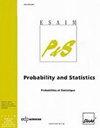质量随时间和空间变化的线性Klein-Gordon方程的三阶指数积分器。
IF 0.7
4区 数学
Q4 STATISTICS & PROBABILITY
引用次数: 1
摘要
在Klein-Gordon方程中考虑质量的时空依赖性,重新解决了量子力学中负概率密度和违反洛伦兹协方差的问题。此外,它将它们的适用性扩展到量子宇宙学领域,在量子宇宙学中,质量的变化可能伴随着高振荡。本文提出了一种三阶指数积分器,其主要思想是将可能由高振荡分量引发的振荡内在地嵌入到数值离散化中。虽然典型的高振荡需要适当的小时间步长,但Filon方法的应用允许在存在非常高的振荡的情况下实现大时间步长。这大大提高了时间步进算法的效率。收敛性及其速率的证明是非平凡的,需要考虑方程的替代表示。我们在时间离散中推导出全局误差增长的界限,并证明,与标准直觉相反,时间积分的误差不会随着振荡频率的增加而增长。通过数值模拟验证了理论研究结果和该方法在所有振动状态下的鲁棒性。本文章由计算机程序翻译,如有差异,请以英文原文为准。
Third-order exponential integrator for linear Klein-Gordon equations with time and space-dependant mass.
Allowing for space- and time-dependence of mass in Klein–Gordon equations re- solves the problem of negative probability density and of violation of Lorenz covariance of interaction in quantum mechanics. Moreover it extends their applicability to the domain of quantum cosmology, where the variation in mass may be accompanied by high oscillations. In this paper we propose a third-order exponential integrator, where the main idea lies in embed- ding the oscillations triggered by the possibly highly oscillatory component intrinsically into the numerical discretisation. While typically high oscillation requires appropriately small time steps, an application of Filon methods allows implementation with large time steps even in the presence of very high oscillation. This greatly improves the efficiency of the time-stepping algorithm. Proof of the convergence and its rate are nontrivial and require alternative representation of the equation under consideration. We derive careful bounds on the growth of global error in time discretisation and prove that, contrary to standard intuition, the error of time integration does not grow once the frequency of oscillations increases. Several numerical simulations are presented to confirm the theoretical investigations and the robustness of the method in all oscillatory regimes.
求助全文
通过发布文献求助,成功后即可免费获取论文全文。
去求助
来源期刊

Esaim-Probability and Statistics
STATISTICS & PROBABILITY-
CiteScore
1.00
自引率
0.00%
发文量
14
审稿时长
>12 weeks
期刊介绍:
The journal publishes original research and survey papers in the area of Probability and Statistics. It covers theoretical and practical aspects, in any field of these domains.
Of particular interest are methodological developments with application in other scientific areas, for example Biology and Genetics, Information Theory, Finance, Bioinformatics, Random structures and Random graphs, Econometrics, Physics.
Long papers are very welcome.
Indeed, we intend to develop the journal in the direction of applications and to open it to various fields where random mathematical modelling is important. In particular we will call (survey) papers in these areas, in order to make the random community aware of important problems of both theoretical and practical interest. We all know that many recent fascinating developments in Probability and Statistics are coming from "the outside" and we think that ESAIM: P&S should be a good entry point for such exchanges. Of course this does not mean that the journal will be only devoted to practical aspects.
 求助内容:
求助内容: 应助结果提醒方式:
应助结果提醒方式:


